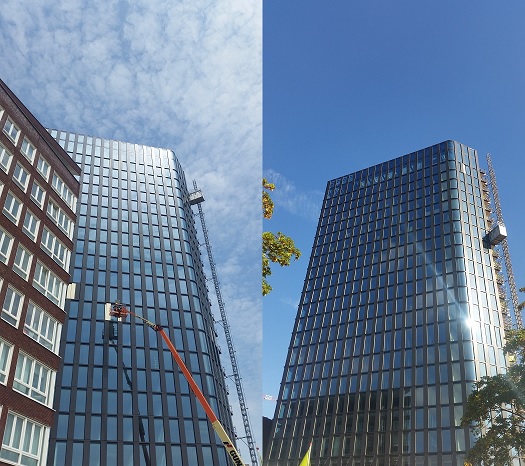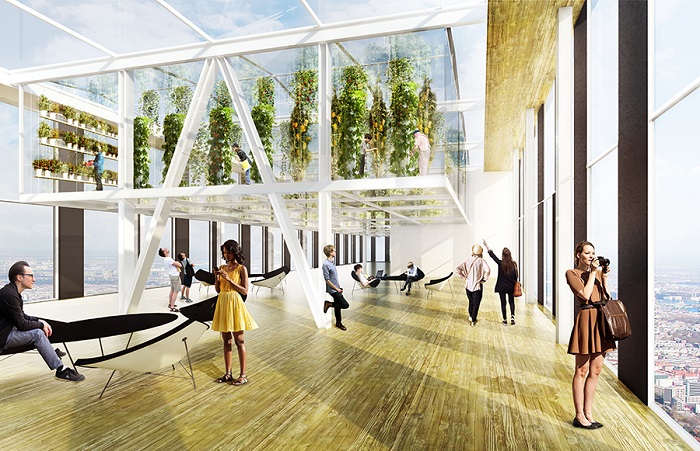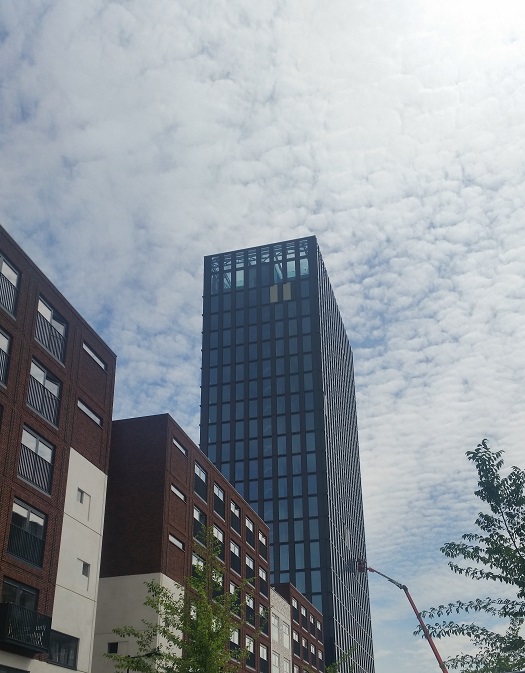Rooftop greenhouse under construction at Amsterdam hotel
In Amsterdam, a special urban farming project is created. On the 22nd floor (at a height of 77 meters) of the sustainable, luxurious Hotel Amstelkwartier, Havecon is building a greenhouse. This greenhouse will host the vegetables that will be served in the hotel’s restaurant. Hotel Amstelkwartier was designed by Paul de Ruiter Architecten. “It’s an innovative design that will close the four cycles of energy, waste, water and use of resources as much as possible.”
The sustainable greenhouse that is built by Havecon & Partners on the roof of Hotel Amstelkwartier, meets the original idea of the hotel owners: creating a living building where the four cycles of energy, water, waste and resources are adjusted to each other as well as possible. The use of modern technology and materials, paired with a smart design, enables a circular cultivation system: water, waste and food scraps from the hotel restaurants are recycled. This way, the environment is also taken into account.

"It's not every day that Havecon & Partners build a greenhouse on a hotel that's under construction. But contractor Amstelside soon came to us for the perfect mix of parties that could deal with such a project. It confirms the good reputation our group members have in the market," says Henk Verbakel of Havecon. "There's quite a lot involved in terms of technique when you want to realize the client's ambitions down to the details. That was quite a challenge, but one we gladly accepted."
Urban farming
This horticultural project in Amsterdam is not unique. Growing vegetables and keeping animals in cities is trending. This trend of urban agriculture is also known as Urban Farming. At the beginning of 2016, a large greenhouse was built on an office building in Den Haag as well.
Reducing light emission and saving energy
Holland Scherming was responsible for developing and mounting the screening installation, that contains several sustainable features. Because of the artificial LED lighting that is used to grow the vegetables, light emission should be restricted during the winter months (September till April). To prevent light emission at night, an assimilation screen is installed. Besides that, the installation holds an energy screen as well, to prevent heat from escaping through the glass roof. At the same time, this climate screen allows enough sunlight into the greenhouse to illuminate the vegetables.

Looking to the future
In addition to the fact that the greenhouse system will be one of the most advanced in the world, the structure has been designed in such a way that all sorts of adjustments can be made easily. The greenhouse has four independent food systems that can all be controlled remotely. In addition, the system is completely integrated into the hotel's intelligent Priva building automation system. In case one of these systems fails, the others can take over. Additional capabilities have been built into the systems, to accommodate the cultivation of other crops.
One of the four independent systems doubles as a (nearly) closed ecosystem. The fish are cultivated in fish trays, and the water, including the fertilizer produced by the fish, is purified and passed on to the plants as food. So the greenhouse makes use of symbiotic water plants and animals. At the moment, research and trials are being conducted to cultivate larvae using food scraps from the hotel to become new fish, which would make the system truly 100% circular.

"Looking at all the aspects of development and construction of the greenhouse, you get an idea of how we will deal with our natural resources in the future," Verbakel says. "Of course I am very proud that we've been able to contribute to that development as Havecon & Partners!"

